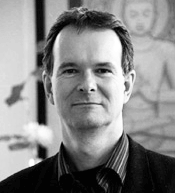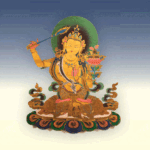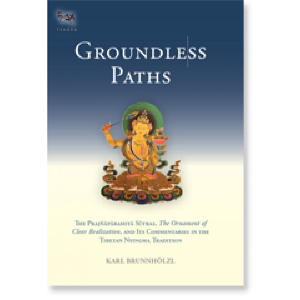| The following article is from the Spring, 2012 issue of the Snow Lion Newsletter and is for historical reference only. You can see this in context of the original newsletter here. |
This short excerpt is taken from
Groundless Paths:
The Prajnaparamita Sutras, The Ornament of Clear Realization, and Its Commentaries in the Tibetan Nyingma Tradition

$54.95 - Hardcover
Based on the four stages of yoga, Madhyamikas realize all phenomena as the nature of suchness free from reference points and thus are able to relinquish all cognitive obscurations of clinging to real existence without exception. These four stages of yoga are as follows:
- Non-Buddhist and Buddhist tirthikas assert a permanent self that is empty of arising and ceasing. Within seeming phenomena, there is nothing that is empty of arising and ceasing (any entity that is permanent and a self), that is, there is no personal self, which is like the horns of a rabbit. Having determined that, through focusing on the focal object of the innate views about such a self one meditates by thinking, In terms of negative determination, there is no self, and, in terms of positive determination, [phenomena] are just mere phenomena. Through this, the clinging to a self is put to an end, which is the yoga of focusing on the lack of a self.
- Whatever is invariably observed together is necessarily not different in substance, such as happiness and the awareness that experiences that happiness. As for the appearance of blue and the mind that perceives this blue, by virtue of the reason of their invariable co-observation it is determined that what appears as a referent does not exist outside of the mind in which it appears. One familiarizes with the fact that what appears as an object, in terms of positive determination, is mere inner mind, and, in terms of negative determination, does not exist as an outer referent. Through this, the clinging to outer referents is relinquished.
- Having determined that, without anything to be apprehended, there is also no apprehender because these two are mutually dependent, one familiarizes with this by thinking, The two of apprehender and apprehended do not exist. Through this, also the clinging to a mere apprehender is eliminated, but what is not relinquished is the clinging to mere nondual wisdom.
- What originates dependency necessarily lacks a real nature (just like the appearances of illusory horses and elephants) and nondual self-awareness is also dependency originating. Having determined this, through familiarizing with all phenomena being free from reference points all cognitive obscurations of clinging to apprehended, apprehender, and self-awareness are relinquished without exception. Therefore, the Madhyamaka path relinquishes the two obscurations completely.
"Groundless Pathscontains the first in-depth study of the Abhisamayalamkara (the text studied most extensively in higher Tibetan Buddhist education) and its commentaries from the perspective of the Nyingma School of Tibetan Buddhism. This study consists mainly of translations of Maitreya's famous text and two commentaries on it by Patrul Rinpoche. These are supplemented by three short texts on the paths and bhumis by the same author as well as extensive excerpts from commentaries by six other Nyingma masters, including Mipham Rinpoche. Thus, this book helps close a long-standing gap in the modern scholarship on the prajnaparamita sutras and the literature on paths and bhumis in mahayana Buddhism.
"Groundless Paths contains Dza Patrul Rinpoche's brilliant commentaries on the Abhisamayalamkara, masterfully translated and annotated by Karl Brunnholzl. This third volume completes the presentation of the major Kagyu and Nyingma works on the prajnaparamita literature in English for the first time."
-ELIZABETH CALLAHAN, translator of Frameworks of Buddhist Philosophy


